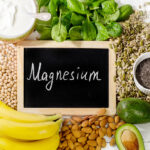Protect your brain health by increasing dietary intake of THIS nutrient
 (NaturalHealth365) Dementia and other brain disorders are more than just health concerns – they have a profound impact on the lives of those affected and their loved ones. In the U.S. alone, over six million people currently suffer from Alzheimer’s disease or other forms of dementia, and this number is expected to skyrocket to 14 million by 2060.
(NaturalHealth365) Dementia and other brain disorders are more than just health concerns – they have a profound impact on the lives of those affected and their loved ones. In the U.S. alone, over six million people currently suffer from Alzheimer’s disease or other forms of dementia, and this number is expected to skyrocket to 14 million by 2060.
But here’s the good news: there is a strong connection between heart and brain health, and studies have shown that boosting your magnesium intake can benefit both. So not only can you take steps to protect your heart, but you can also support your brain function and potentially reduce your risk of developing brain disorders.
Magnesium intake can improve both brain and heart function, as stated by researchers from the Australian National University.
Magnesium: A key element for healthy aging of both body and mind
As we age, changes occur in both our body and mind. While we cannot stop the aging process, there are ways to support healthy aging. Rather than relying solely on brain games and diet, adding a magnesium supplement to your daily routine may have benefits.
Research suggests that increased magnesium intake may slow the rate of brain aging and support stronger brain health over time. Additionally, consuming magnesium-rich foods such as organic nuts, pumpkin seeds, chia seeds, and leafy greens like spinach may also be beneficial in reducing the risk of cognitive decline, including dementia.
Insights from the Australian National University study reveal surprising connection between magnesium and youthful brain aging
A recent study conducted by academics at the Australian National University examined over 6,000 individuals with solid cognitive health between the ages of 40 and 73. The study found that those who consumed more than 550 mg of magnesium per day had a brain age around one year younger than their biological brain age by the time they reached age 55, compared to those who consumed a regular amount of 350 mg of magnesium per day.
Increasing magnesium intake by 40% per day has the potential to reduce brain shrinkage related to age, leading to improved cognitive function and a reduced risk of late-life dementia. This is a significant finding, considering the top-heavy population age distribution in the United States and the rest of the world.
The baby boomers, currently in their 60s and 70s, were the largest age cohort until their millennial offspring surpassed them in number. As these two massive age cohorts age, dementia is becoming a leading public health risk. It is estimated that nearly 155 million people will be affected by dementia by 2050.
Is magnesium really the best defense against dementia?
As of 2023, Western medicine offers no cure for dementia. Furthermore, Big Pharma’s dementia treatments have proven ineffective over the preceding three decades. As a result, the focus has shifted toward preventing dementia rather than curing it. Simply put, avoiding toxins and maintaining a healthy (organic) diet are two of the best ways to protect your brain function.
Those who incorporate magnesium into their diet in early adulthood stand to benefit as the aging process ensues. As noted by the study authors, increasing magnesium in the diet at a young age protects against cognitive decline as well as neurodegenerative disease by the point middle age is reached. However, even those who increase their intake of magnesium in their 50s, 60s, and beyond will benefit from its protective cognitive properties through their golden years.
To learn more about the best ways to avoid dementia, own the Alzheimer’s and Dementia Summit, created by Jonathan Landsman.
Sources for this article include:



